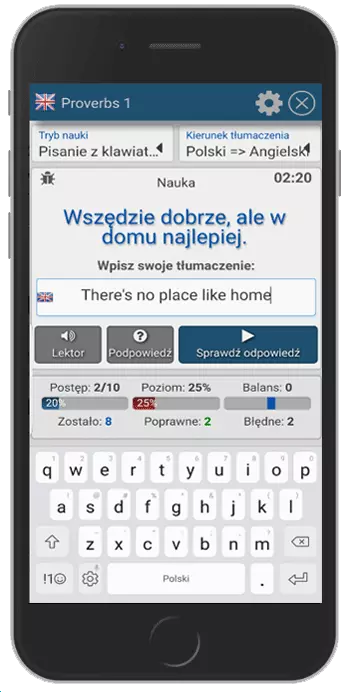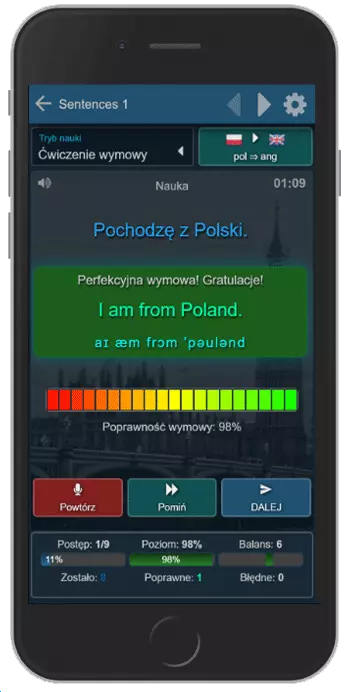
 "KRAJU" w języku angielskim:
"KRAJU" w języku angielskim:| Angielskie słówko [transkrypcja fonetyczna] | |
|---|---|
 |
W naszym kraju mamy religię , która nie pozwala jeść mięsa ze szczura. |
 "KRAJU" w języku polskim:
"KRAJU" w języku polskim:| Angielskie słówko [transkrypcja fonetyczna] | |
|---|---|
 |
inland [ɪn'lænd] |
 |
midland ['mɪdlænd] |
 |
inland [ɪn'lænd] |
 |
at home |
 |
highlands ['haɪləndz] |
 |
foreign ['fɔrɪn] |
 |
nationwide ['neɪʃənwaɪd] |
 |
in one country to his office in another |
 |
the local news |
 |
She is visiting another country [ʃi: ɪz 'vɪzətɪŋ ə'nʌðə(r) 'kʌntrɪ] |
 |
heartland ['hɑ:tlænd] |
 |
In which region of this country were you raised? |
 |
It's from... |
 |
do people in your country like animals? |
 |
jump ball |
 |
to vary from country to country [tu 'vɛərɪ frɔm 'kʌntrɪ tu 'kʌntrɪ] |
 |
a lot of people fled the country [ə lɔt ɔv 'pi:pl flɛd ðə 'kʌntrɪ] |
 |
in the interior of the country |
 |
What's the language in your country |
 |
Are restaurants cheap or expensive in your country? |
 |
national team ['næʃənl ti:m] |
 |
set foot in a country [sɛt fut ɪn ə 'kʌntrɪ] |
 |
Ask not what your country can do for you, ask what you can do for your country [æsk nɔt wɔt jɔ:(r) 'kʌntrɪ kæn du: fɔ:(r) ju: æsk wɔt ju: kæn du: fɔ:(r) jɔ:(r) 'kʌntrɪ] |
 |
What's your country lacking in most? [wɔts jɔ:(r) 'kʌntrɪ 'lækɪŋ ɪn məust] |
 |
My country is lacking in good roads most [maɪ 'kʌntrɪ ɪz 'lækɪŋ ɪn gud rəudz məust] |
 |
I my country we have a religion which doesn't allow us to eat rat meat. [aɪ maɪ 'kʌntrɪ wi: hæv ə rɪ'lɪʤən wɪʧ 'dʌzənt ə'lau ʌs tu i:t ræt mi:t] |
 |
Women in my country got the vote in 1918 ['wɪmɪn ɪn maɪ 'kʌntrɪ gɔt ðə vəut ɪn 1918] |
 |
A stranger is a person who we don't know but a foreigner is a person who comes from another country. [ə 'streɪnʤə(r) ɪz ə 'pə:sɪn hu: wi: dəunt nəu bʌt ə 'fɔ:ənə(r) ɪz ə 'pə:sɪn hu: kʌmz frɔm ə'nʌðə] |
 |
throughout the country [θru:'aut ðə 'kʌntrɪ] |
 |
up and down the country [ʌp ænd daun ðə 'kʌntrɪ] |
 |
In every country there are interesting regional recipes handed down for generations. [ɪn 'ɛvrɪ 'kʌntrɪ ðɛə(r) ɑ:(r) 'ɪntrɪstɪŋ 'ri:ʤənl 'rɛsɪpɪz 'hændəd daun fɔ:(r) ʤɛnər'eɪʃ&] |
 |
enter the country ['ɛntə(r) ðə 'kʌntrɪ] |
 |
Do you know any customs that have been preserved in your country since ancient times [du: ju: nəu 'ɛnɪ 'kʌstəmz ðæt hæv bɪ:n prə'zə:vd ɪn jɔ:(r) 'kʌntrɪ sɪns 'eɪnʧənt taɪmz] |
 |
inland [ɪn'lænd] |
 |
The market in my country is flooded with cheap Chinese goods [ðə 'mɑ:kɪt ɪn maɪ 'kʌntrɪ ɪz 'flʌdəd wɪð ʧi:p ʧaɪ'ni:z gudz] |
 |
The most popular tourist spots in my country are Ustka, Międzyzdroje [ðə məust 'pɔpjulə(r) 'tuərɪst spɔts ɪn maɪ 'kʌntrɪ ɑ:(r) Ustka Międzyzdroje] |
 |
In my country, we have to be 18 to drive [ɪn maɪ 'kʌntrɪ wi: hæv tu bi: 18 tu draɪv] |
 |
FLEE THE COUNTRY [fli: ðə 'kʌntrɪ] |
 |
arrive in [ə'raɪv ɪn] |
 |
In my country we have religion [ɪn maɪ 'kʌntrɪ wi: hæv rɪ'lɪʤən] |
 |
policies on the country ['pɔlɪsɪz ɔn ðə 'kʌntrɪ] |
 |
national ['næʃənl] |
 |
fled the country [flɛd ðə 'kʌntrɪ] |
 |
foreign ['fɔ:ən] |
 |
foreign ['fɔ:ən] |
 |
treason ['tri:zən] |
 |
come over (visit) [kʌm 'əuvə(r) 'vɪzɪt] |
 |
We are proud of our country [wi: ɑ:(r) praud ɔv 'auə(r) 'kʌntrɪ] |
 |
nationally ['næʃənəlɪ] |
 |
deep in the interior of country [di:p ɪn ðə ɪn'tɪərɪə(r) ɔv 'kʌntrɪ] |
 |
to flee the country [tu fli: ðə 'kʌntrɪ] |
 |
to leave or enter a country [tu li:v ɔ:(r) 'ɛntə(r) ə 'kʌntrɪ] |
 |
settle in another country ['sɛtl ɪn ə'nʌðə(r) 'kʌntrɪ] |
 |
My ancestors came to my country in 1800 s. [maɪ 'ænsɛstərz keɪm tu maɪ 'kʌntrɪ ɪn 1800 ɛs] |
 |
losing matches at home and abroad ['lju:zɪŋ 'mæʧəz æt həum ænd ə'brɔ:d] |
 |
in the whole country [ɪn ðə həul 'kʌntrɪ] |
 |
to tour a country / continent [tu tuə(r) ə 'kʌntrɪ 'kɔntɪnənt] |
 |
a tour of a country [ə tuə(r) ɔv ə 'kʌntrɪ] |
 |
weather conditions in our country are not conducive to the development of tourism ['wɛðə(r) kən'dɪʃənz ɪn 'auə(r) 'kʌntrɪ ɑ:(r) nɔt kən'du:sɪv tu ðə dɪ'vɛləpmənt ɔv 'turɪzəm] |
 |
the recognition of a country [ðə rɛkəg'nɪʃən ɔv ə 'kʌntrɪ] |
 |
Inca ['ɪŋkə] |
 |
move to another country [mu:v tu ə'nʌðə(r) 'kʌntrɪ] |
 |
In other words you won't be allowed to leave the country. [ɪn 'ʌðə(r) wə:dz ju: won't bi: ə'laud tu li:v ðə 'kʌntrɪ] |
 |
bring goods into the country [brɪŋ gudz 'ɪntu ðə 'kʌntrɪ] |
 |
can do for your country [kæn du: fɔ:(r) jɔ:(r) 'kʌntrɪ] |
 |
What happens when people break traffic rules your in your country? [wɔt 'hæpənz wɛn 'pi:pl breɪk 'træfɪk ru:lz jɔ:(r) ɪn jɔ:(r) 'kʌntrɪ] |
 |
can you think of a dish that is specialty in some countries [kæn ju: θɪŋk ɔv ə dɪʃ ðæt ɪz 'spɛʃəltɪ ɪn sʌm 'kʌntrɪz] |
 |
exile ['ɛgzaɪl] |
 |
arrive in a country [ə'raɪv ɪn ə 'kʌntrɪ] |
 |
The constitution bars the armed forces from law enforcement within the country. [ðə kɔnstɪ'tju:ʃən bɑ:z ðə ɑ:md 'fɔ:sɪz frɔm lɔ: en'fɔ:smənt wɪð'ɪn ðə 'kʌntrɪ] |
 |
restaurants are also gaining fans across the country. ['rɛstərɑnts ɑ:(r) 'ɔ:lsəu 'geɪnɪŋ fænz ək'rɔs ðə 'kʌntrɪ] |
 |
Which country would you never like to go to? [wɪʧ 'kʌntrɪ wud ju: 'nɛvə(r) laɪk tu gəu tu] |
 |
This river is the widest one in the country. [ðɪs 'rɪvə(r) ɪz ðə 'waɪdɪst wʌn ɪn ðə 'kʌntrɪ] |
 |
Now sales have slowed due to the weather and the lock down nationwide [nau seɪlz hæv sləud dju: tu ðə 'wɛðə(r) ænd ðə lɔk daun 'neɪʃənwaɪd] |
 |
What is the weather in your country like? [wɔt ɪz ðə 'wɛðə(r) ɪn jɔ:(r) 'kʌntrɪ laɪk] |
 |
I am looking forward to visiting another country. [aɪ æm 'lukɪŋ 'fɔ:wəd tu 'vɪzətɪŋ ə'nʌðə(r) 'kʌntrɪ] |
 |
arrive in [ə'raɪv ɪn] |
 |
nationwide ['neɪʃənwaɪd] |
 |
Which country are you from? [wɪʧ 'kʌntrɪ ɑ:(r) ju: frɔm] |
 |
This can no longer be taken for granted in our country [ðɪs kæn nəu 'lɔ:ŋgə(r) bi: 'teɪkən fɔ:(r) 'grɑ:ntɪd ɪn 'auə(r) 'kʌntrɪ] |
 |
Oil accounts for about thirty per cent of this country's export [ɔɪl ə'kaunts fɔ:(r) ə'baut 'θə:dɪ pə: sɛnt ɔv ðɪs 'kʌntrɪz 'ɛkspɔ:rt] |
 |
The disease is sweeping the country. [ðə dɪ'zi:z ɪz 'swi:pɪŋ ðə 'kʌntrɪ] |
 |
Mormons permitted the plurality of wives but they were eventually forced to follow the law of the country. ['mɔ:mənz pər'mɪtəd ðə plər'ælɪtɪ ɔv waɪvz bʌt ðeɪ wə:(r) ɪ'vɛnʧəwəlɪ fɔ:st tu 'fɔləu ðə lɔ: ɔv ðə 'kʌntrɪ] |
 |
Mormons permitted the plurality of wives but they were eventually forced to follow the law of the country. ['mɔ:mənz pər'mɪtəd ðə plər'ælɪtɪ ɔv waɪvz bʌt ðeɪ wə:(r) ɪ'vɛnʧəwəlɪ fɔ:st tu 'fɔləu ðə lɔ: ɔv ðə 'kʌntrɪ] |
 |
Mormons permitted the plurality of wives but they were eventually forced to follow the law of the country. ['mɔ:mənz pər'mɪtəd ðə plər'ælɪtɪ ɔv waɪvz bʌt ðeɪ wə:(r) ɪ'vɛnʧəwəlɪ fɔ:st tu 'fɔləu ðə lɔ: ɔv ðə 'kʌntrɪ] |



